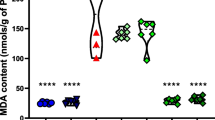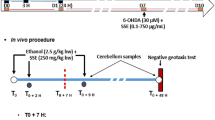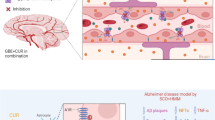Abstract
Inhibition of enzymes responsible for endocannabinoid hydrolysis represents an invaluable emerging tool for the potential treatment of neurodegenerative disorders. Monoacylglycerol lipase (MAGL) is the enzyme responsible for degrading 2-arachydonoylglycerol (2-AG), the most abundant endocannabinoid in the central nervous system (CNS). Here, we tested the effects of the selective MAGL inhibitor JZL184 on the 3-nitropropinic acid (3-NP)-induced short-term loss of mitochondrial reductive capacity/viability and oxidative damage in rat brain synaptosomal/mitochondrial fractions and cortical slices. In synaptosomes, while 3-NP decreased mitochondrial function and increased lipid peroxidation, JZL184 attenuated both markers. The protective effects evoked by JZL184 on the 3-NP-induced mitochondrial dysfunction were primarily mediated by activation of cannabinoid receptor 2 (CB2R), as evidenced by their inhibition by the selective CB2R inverse agonist JTE907. The cannabinoid receptor 1 (CB1R) also participated in this effect in a lesser extent, as evidenced by the CB1R antagonist/inverse agonist AM281. In contrast, activation of CB1R, but not CB2R, was responsible for the protective effects of JZL184 on the 3-NP-iduced lipid peroxidation. Protective effects of JZL184 were confirmed in other toxic models involving excitotoxicity and oxidative damage as internal controls. In cortical slices, JZL184 ameliorated the 3-NP-induced loss of mitochondrial function, the increase in lipid peroxidation, and the inhibition of succinate dehydrogenase (mitochondrial complex II) activity, and these effects were independent on CB1R and CB2R, as evidenced by the lack of effects of AM281 and JTE907, respectively. Our novel results provide experimental evidence that the differential protective effects exerted by JZL184 on the early toxic effects induced by 3-NP in brain synaptosomes and cortical slices involve MAGL inhibition, and possibly the subsequent accumulation of 2-AG. These effects involve pro-energetic and redox modulatory mechanisms that may be either dependent or independent of cannabinoid receptors’ activation.




Similar content being viewed by others
Availability of Data and Materials
The data that support the findings of this study are available from the corresponding authors, ALCG and AS, upon reasonable request.
References
Aguilera-Portillo G, Rangel-López E, Villeda-Hernández J, Chavarría A, Castellanos P, Elmazoglu Z, Karasu Ç, Túnez I, Pedraza G, Königsberg M, Santamaría A (2019) The pharmacological inhibition of fatty acid amide hydrolase prevents excitotoxic damage in the rat striatum: possible involvement of CB1 receptors regulation. Mol Neurobiol 56:844–856. https://doi.org/10.1007/s12035-018-1129-2
Aymerich MS, Aso E, Abellanas MA, Tolon RM, Ramos JA, Ferrer I, Romero J, Fernández-Ruiz J (2018) Cannabinoid pharmacology/therapeutics in chronic degenerative disorders affecting the central nervous system. Biochem Pharmacol 157:67–84. https://doi.org/10.1016/j.bcp.2018.08.016
Aymerich MS, Rojo-Bustamante E, Molina C, Celorrio M, Sánchez-Arias JA, Franco R (2016) Neuroprotective effect of JZL184 in MPP(+)-treated SH-SY5Y cells through CB2 receptors. Mol Neurobiol 53:2312–2319. https://doi.org/10.1007/s12035-015-9213-3
Bradford MM (1976) A rapid and sensitive method for the quantitation of microgram quantities of protein utilizing the principle of protein-dye binding. Anal Biochem 72:248–254. https://doi.org/10.1006/abio.1976.9999
Brouillet E, Jacquard C, Bizat N, Blum D (2005) 3-Nitropropionic acid: a mitochondrial toxin to uncover physiopathological mechanisms underlying striatal degeneration in Huntington’s disease. J Neurochem 95:1521–1540. https://doi.org/10.1111/j.1471-4159.2005.03515.x
Carloni S, Alonso-Alconada D, Girelli S, Duranti A, Tontini A, Piomelli D, Hilario E, Alvarez A, Balduini W (2012) Pretreatment with the monoacylglycerol lipase inhibitor URB602 protects from the long-term consequences of neonatal hypoxic-ischemic brain injury in rats. Pediatr Res 72:400–406. https://doi.org/10.1038/pr.2012.91
Chanda PK, Gao Y, Mark L, Btesh J, Strassle BW, Lu P, Piesla MJ, Zhang M-Y, Bingham B, Uveges A, Kowal D, Garbe D, Kouranova EV, Ring RH, Bates B, Pangalos MN, Kennedy JD, Whiteside GT, Samad TA (2010) Monoacylglycerol lipase activity is a critical modulator of the tone and integrity of the endocannabinoid system. Mol Pharmacol 78(6):996–1003. https://doi.org/10.1124/mol.110.068304
Chaturvedi RK, Beal MF (2013) Mitochondrial disease of the brain. Free Radic Biol Med 63:1–29. https://doi.org/10.1016/j.freeradbiomed.2013.03.018
Chavira-Ramos K, Orozco-Morales M, Karasu C, Tinkov AA, Aschner M, Santamaría A, Colín-González AL (2021) URB597 prevents the short-term excitotoxic cell damage in rat cortical slices: role of cannabinoid 1 receptors. Neurotox Res 39:146–155. https://doi.org/10.1007/s12640-020-00301-1
Chen X, Zhang J, Chen C (2011) Endocannabinoid 2-arachidonoylglycerol protects neurons against β-amyloid insults. Neuroscience 178:159–168. https://doi.org/10.1016/j.neuroscience.2011.01.024
Choi S-H, Arai AL, Mou Y, Kang B, Yen CC-C, Hallenbeck J, Silva AC (2018) Neuroprotective effects of MAGL (monoacylglycerol lipase) inhibitors in experimental ischemic stroke. Stroke 49(3):718–726. https://doi.org/10.1161/STROKEAHA.117.019664
Colín-González AL, Aguilera G, Santamaría A (2016) Cannabinoids: glutamatergic transmission and kynurenines. Adv Neurobiol 12:173–198. https://doi.org/10.1007/978-3-319-28383-8_10
Colín-González AL, Maya-López M, Pedraza-Chaverrí J, Ali SF, Chavarría A, Santamaría A (2014) The Janus faces of 3-hydroxykynurenine: dual redox modulatory activity and lack of neurotoxicity in the rat striatum. Brain Res 1589:1–14. https://doi.org/10.1016/j.brainres.2014.09.034
Cravatt BF, Giang DK, Mayfield SP, Boger DL, Lerner RA, Gilula NB (1996) Molecular characterization of an enzyme that degrades neuromodulatory fatty-acid amides. Nature 384:83–87. https://doi.org/10.1038/384083a0
Cristino L, Bisogno T, Di Marzo V (2020) Cannabinoids and the expanded endocannabinoid system in neurological disorders. Nature Rev Neurology 16(1):9–29. https://doi.org/10.1038/s41582-019-0284-z
Di Marzo V (2018) New approaches and challenges to targeting the endocannabinoid system. Nature Rev Drug Discovery 17(9):623–639. https://doi.org/10.1038/nrd.2018.115
Dinh TP, Carpenter D, Leslie FM, Freund TF, Katona I, Sensi SL, Kathuria S, Piomelli D (2002) Brain monoglyceride lipase participating in endocannabinoid inactivation. Proc Natl Acad Sci USA 99:10819–10824. https://doi.org/10.1073/pnas.152334899
Du H, Chen X, Zhang J, Chen C (2011) Inhibition of COX-2 expression by endocannabinoid 2-arachidonoylglycerol is mediated via PPAR-γ. Br J Pharmacol 163(7):1533–1549. https://doi.org/10.1111/j.1476-5381.2011.01444.x
Fernández-Suárez D, Celorrio M, Riezu-Boj JI, Ugarte A, Pacheco R, González H, Oyarzabal J, Hillard CJ, Franco R, Aymerich MS (2014) Monoacylglycerol lipase inhibitor JZL184 is neuroprotective and alters glial cell phenotype in the chronic MPTP mouse model. Neurobiol Aging 35:2603–2616. https://doi.org/10.1016/j.neurobiolaging.2014.05.021
Fucich EA, Stielper ZF, Cancienne HL, Edwards S, Gilpin NW, Molina PE, Middleton JW (2020) Endocannabinoid degradation inhibitors ameliorate neuronal and synaptic alterations following traumatic brain injury. 123:707–717. https://doi.org/10.1152/jn.00570.2019
García del Caño G, Aretxabala X, González-Burguera I, Montaña M, López de Jesús M, Barrondo S, Barrio RJ, Sampedro C, Goicolea MA, Sallés J (2015) Nuclear diacylglycerol lipase-α in rat brain cortical neurons: evidence of 2-arachidonoylglycerol production in concert with phospholipase C-β activity. J Neurochem 132(5):489–503. https://doi.org/10.1111/jnc.12963
García-Morales V, Montero F, Moreno-López B (2015) Cannabinoid agonists rearrange synaptic vesicles at excitatory synapses and depress motoneuron activity in vivo. Neuropharmacology 92:69–79. https://doi.org/10.1016/j.neuropharm.2014.12.036
Gil-Ordóñez A, Martín-Fontecha M, Ortega-Gutiérrez S, López-Rodríguez ML (2018) Monoacylglycerol lipase (MAGL) as a promising therapeutic target. Biochem Pharmacol 157:18–32. https://doi.org/10.1016/j.bcp.2018.07.036
Grabner GF, Zimmermann R, Schicho R, Taschler U (2017) Monoglyceride lipase as a drug target: at the crossroads of arachidonic acid metabolism and endocannabinoid signaling. Pharmacol Ther 175:35–46. https://doi.org/10.1016/j.pharmthera.2017.02.033
Hariharan A, Shetty S, Shirole T, Jagtap AG (2014) Potential of protease inhibitor in 3-nitropropionic acid induced Huntington’s disease like symptoms: mitochondrial dysfunction and neurodegeneration. Neurotoxicology 45:139–148. https://doi.org/10.1016/j.neuro.2014.10.004
Hu SS-J, Bradshaw HB, Chen JS-C, Tan B, Walker JM (2008) Prostaglandin E2 glycerol ester, an endogenous COX-2 metabolite of 2-arachidonoylglycerol, induces hyperalgesia and modulates NFκB activity. Br J Pharmacol 153(7):1538–1549. https://doi.org/10.1038/bjp.2008.33
Imperatore R, Morello G, Luongo L, Taschler U, Romano R, Gregorio D, De Belardo C, Maione S, Marzo V, Di Cristino L (2015) Genetic deletion of monoacylglycerol lipase leads to impaired cannabinoid receptor CB1R signaling and anxiety-like behavior J Neurochem 135(4):799–813 https://doi.org/10.1111/jnc.13267
Kawamura Y, Fukaya M, Maejima T, Yoshida T, Miura E, Watanabe M, Ohno-Shosaku T, Kano M (2006) The CB1 cannabinoid receptor is the major cannabinoid receptor at excitatory presynaptic sites in the hippocampus and cerebellum. J Neurosci 26(11):2991–3001. https://doi.org/10.1523/JNEUROSCI.4872-05.2006
Kerr DM, Harhen B, Okine BN, Egan LJ, Finn DP, Roche M (2013) The monoacylglycerol lipase inhibitor JZL184 attenuates LPS-induced increases in cytokine expression in the rat frontal cortex and plasma: differential mechanisms of action. Br J Pharmacol 169:808–819. https://doi.org/10.1111/j.1476-5381.2012.02237.x
Khasabova IA, Yao X, Paz J, Lewandowski CT, Lindberg AE, Coicou L, Burlakova N, Simone DA, Seybold VS (2014) JZL184 is antihyperalgesic in a murine model of cisplatin-induced peripheral neuropathy. Pharmacol Res 90:67–75. https://doi.org/10.1016/j.phrs.2014.09.008
Lan R, Gatley J, Lu Q, Fan P, Fernando SR, Volkow ND, Pertwee R, Makriyannis A (1999) Design and synthesis of the CB1 selective cannabinoid antagonist AM281: a potential human SPECT ligand. AAPS PharmSci 1:E4. https://doi.org/10.1208/ps010204
Li Q, Yan H, Wilson WA, Swartzwelder HS (2010) Modulation of NMDA and AMPA-mediated synaptic transmission by CB1 receptors in frontal cortical pyramidal cells. Brain Res 1342:127–137. https://doi.org/10.1016/j.brainres.2010.04.029
Long JZ, Li W, Booker L, Burston JJ, Kinsey SG, Schlosburg JE, Pavón FJ, Serrano AM, Selley DE, Parsons LH, Lichtman AH, Cravatt BF (2009) Selective blockade of 2-arachydonoylglycerol hydrolysis produces cannabinoid behavioral effects. Nat Chem Biol 5(1):37–44. https://doi.org/10.1038/nchembio.129
Lowry OH, Rosebrough NJ, Farr AL, Randall RJ (1951) Protein measurement with the Folin phenol reagent. J Biol Chem 193:265–275. PMID:14907713
Maya-López M, Rubio-López LC, Rodríguez-Alvarez IV, Orduño-Piceno J, Flores-Valdivia Y, Colonnello A, Rangel-López E, Túnez I, Prospéro-García O, Santamaría A (2020) A cannabinoid receptor-mediated mechanism participates in the neuroprotective effects of oleamide against excitotoxic damage in rat brain synaptosomes and cortical slices. Neurotox Res 37:126–135. https://doi.org/10.1007/s12640-019-00083-1
Maya-López M, Ruiz-Contreras HA, Negrete-Ruíz MJ, Martínez-Sánchez JE, Benítez-Valenzuela J, Colín-González AL, Villeda-Hernández J, Sánchez-Chapul L, Parra-Cid C, Rangel-López E, Santamaría A (2017) URB597 reduces biochemical, behavioral and morphological alterations in two neurotoxic models in rats. Biomed Pharmacother 88:745–753. https://doi.org/10.1016/j.biopha.2017.01.116
Muddapu VR, Dharshini SAP, Chakravarthy VS, Gromiha MM (2020) Neurodegenerative diseases—is metabolic deficiency the root cause? Front Neurosci 14:213. https://doi.org/10.3389/fnins.2020.00213
Navia-Paldanius D, Aaltonen N, Lehtonen M, Savinainen JR, Taschler U, Radner FPW, Zimmermann R, Laitinen JT (2015) Increased tonic cannabinoid CB1R activity and brain region-specific desensitization of CB1R Gi/o signaling axis in mice with global genetic knockout of monoacylglycerol lipase. Eur J Pharmaceutical Sci 77:180–188. https://doi.org/10.1016/j.ejps.2015.06.005
Nomura DK, Morrison BE, Blankman JL, Long JZ, Kinsey SG, Marcondes MCG, Ward AM, Hahn YK, Lichtman AH, Conti B, Cravatt BF (2011) Endocannabinoid hydrolysis generates brain prostaglandins that promote neuroinflammation. Science 334(6057):809–813. https://doi.org/10.1126/science.1209200
Pertwee RG (2010) Receptors and channels targeted by synthetic cannabinoid receptor agonists and antagonists. Curr Med Chem 17(14):1360–1381. https://doi.org/10.2174/092986710790980050
Pertwee RG, Howlett AC, Abood ME, Alexander SPH, Di Marzo V, Elphick MR, Greasley PJ, Hansen HS, Kunos G, Mackie K, Mechoulam R, Ross RA (2010) International union of basic and clinical pharmacology. LXXIX. Cannabinoid receptors and their ligands: beyond CB1 and CB2. Pharmacol Rev 62(4):588–631. https://doi.org/10.1124/pr.110.003004
Petrosino S, Di Marzo V (2010) FAAH and MAGL inhibitors: therapeutic opportunities from regulating endocannabinoid levels. Curr Opin Investig Drugs 11:51–62. PMID:20047159
Pihlaja R, Takkinen J, Eskola O, Vasara J, López-Picón FR, Haaparanta-Solin M, Rinne JO (2015) Monoacylglycerol lipase inhibitor JZL184 reduces neuroinflammatory response in APdE9 mice and in adult mouse glial cells. J Neuroinflammation 12:81. https://doi.org/10.1186/s12974-015-0305-9
Popov VN, Eprintsev AT, Fedorin DN, Igamberdiev AU (2010) Succinate dehydrogenase in Arabidopsis thaliana is regulated by light via phytochrome A. FEBS Lett 584(1):199–202. https://doi.org/10.1016/j.febslet.2009.11.057
Rangel-López E, Colín-González AL, Paz-Loyola AL, Pinzón E, Torres I, Serratos IN, Castellanos P, Wajner M, Souza DO, Santamaría A (2015) Cannabinoid receptor agonists reduce the short-term mitochondrial dysfunction and oxidative stress linked to excitotoxicity in the rat brain. Neuroscience 285:97–106. https://doi.org/10.1016/j.neuroscience.2014.11.016
Reyes-Soto CY, Villaseca-Flores M, Ovalle-Noguez EA, Nava-Osorio J, Galván-Arzate S, Rangel-López E, Maya-López M, Retana-Márquez S, Túnez I, Tinkov AA, Ke T, Aschner M, Santamaría A (2022) Oleamide reduces mitochondrial dysfunction and toxicity in rat cortical slices through the combined action of cannabinoid receptors activation and induction of antioxidant activity. Neurotox Res 40:2167–2178. https://doi.org/10.1007/s12640-022-00575-7
Sánchez-Rodríguez MA, Gómez O, Esteban PF, García-Ovejero D, Molina-Holgado E (2018) The endocannabinoid 2-arachidonoylglycerol regulates oligodendrocyte progenitor cell migration. Biochem Pharmacol 157:180–188. https://doi.org/10.1016/j.bcp.2018.09.006
Scalvini L, Piomelli D, Mor M (2016) Monoglyceride lipase: structure and inhibitors. Chem Phys Lipids 197:13–24. https://doi.org/10.1016/j.chemphyslip.2015.07.011
Schlosburg JE, Blankman JL, Long JZ, Nomura DK, Pan B, Kinsey SG, Nguyen PT, Ramesh D, Booker L, Burston JJ, Thomas EA, Selley DE, Sim-Selley LJ, Liu Q, Lichtman AH, Cravatt BF (2010) Chronic monoacylglycerol lipase blockade causes functional antagonism of the endocannabinoid system. Nature Neurosci 13(9):1113–1119. https://doi.org/10.1038/nn.2616
Sugiura T, Kishimoto S, Oka S, Gokoh M (2006) Biochemistry, pharmacology and physiology of 2-arachidonoylglycerol, an endogenous cannabinoid receptor ligand. Prog Lipid Res 45(5):405–446. https://doi.org/10.1016/j.plipres.2006.03.003
Sylantyev S, Jensen TP, Ross RA, Rusakov DA (2013) Cannabinoid- and lysophosphatidylinositol-sensitive receptor GPR55 boosts neurotransmitter release at central synapses. Proc Natl Acad Sci USA 110(13):5193–5198. https://doi.org/10.1073/pnas.1211204110
Tsuboi K, Uyama T, Okamoto Y, Ueda N (2018) Endocannabinoids and related N-acylethanolamines: biological activities and metabolism. Inflamm Regen 38:28. https://doi.org/10.1186/s41232-018-0086-5
Túnez I, Tasset I, Pérez-De La Cruz V, Santamaria A (2010) 3-Nitropropionic acid as a tool to study the mechanisms involved in Huntington’s disease: past, present and future. Molecules 15(2):878–916. https://doi.org/10.3390/molecules15020878
Viscomi MT, Oddi S, Latini L, Bisicchia E, Maccarrone M, Molinari M (2010) The endocannabinoid system: a new entry in remote cell death mechanisms. Exp Neurol 224:56–65. https://doi.org/10.1016/j.expneurol.2010.03.023
Xu J, Guo Q, Huo K, Song Y, Li N, Du J (2021) JZL184 protects hippocampal neurons from oxygen-glucose deprivation-induced injury via activating Nrf2/ARE signaling pathway. Human Exp Toxicol 40:1084–1094. https://doi.org/10.1177/0960327120984220
Xu JY, Chen C (2015) Endocannabinoids in synaptic plasticity and neuroprotection. Neuroscientist 21:152–168. https://doi.org/10.1177/1073858414524632
Yui K, Imataka G, Nakamura H, Ohara N, Naito Y (2015) Eicosanoids derived from arachidonic acid and their family prostaglandins and cyclooxygenase in psychiatric disorders. Curr Neuropharmacol 13(6):776–785. https://doi.org/10.2174/1570159X13666151102103305
Zhang J, Chen C (2018) Alleviation of neuropathology by inhibition of monoacylglycerol lipase in APP transgenic mice lacking CB2 receptors. Mol Neurobiol 55(6):4802–4810. https://doi.org/10.1007/s12035-017-0689-x
Zhang X, Thayer SA (2018) Monoacylglycerol lipase inhibitor JZL184 prevents HIV-1 gp120-induced synapse loss by altering endocannabinoid signaling. Neuropharmacology 128:269–281. https://doi.org/10.1016/j.neuropharm.2017.10.023
Zhu D, Zhang J, Hashem J, Gao F, Chen C (2023) Inhibition of 2-arachidonoylglycerol degradation enhances glial immunity by single-cell transcriptomic analysis. J Neuroinflammation 20(1):17. https://doi.org/10.1186/s12974-023-02701-4
Acknowledgements
We appreciate the excellent technical assistance of Jade Nava-Osorio, Enid Ovalle-Noguez and Marisol Maya-López.
Funding
This work was supported by the CONACYT-TUBITAK collaborative agreement (grant 265991 given to AS) and the National Institute of Environmental Health Sciences (grants R01ES03771 and R01ES10563 given to MA). None of the sponsors were involved in design, collection, analysis, or interpretation of data, neither in writing of the report or decision to submit the article for publication.
Author information
Authors and Affiliations
Contributions
A.L.C.-G. and A.S. designed the whole study. K.J.P.-R., K.C.-R., and S.G.-A. performed all experiments and prepared the figures. S.G.-A., E.R.-L., C.K., I.T., A.V.S., M.A., and M.O.-M. provided critical comments to design, interpretation of results and discussion, as well as reagents. M.A. and A.S. wrote the main manuscript. All authors reviewed the manuscript.
Corresponding authors
Ethics declarations
Ethics Approval
All experiments were carried out in accordance with the National Institute of Health Guide for the Care and Use of Laboratory Animals (NIH Publication No. 80–23) revised 1996, and the local Ethical Committees. Formal approval to conduct the experimental procedures was obtained from the animal subjects review board of the Instituto Nacional de Neurología y Neurocirugía (Project numbers 17/20 and 73/20). All efforts were made to minimize animals pain suffering during the experiments.
Conflict of Interest
The authors declare no competing interests.
Additional information
Publisher's Note
Springer Nature remains neutral with regard to jurisdictional claims in published maps and institutional affiliations.
This manuscript was submitted to the journal for consideration for the first time prior to the change of affiliation of the corresponding author.
Rights and permissions
Springer Nature or its licensor (e.g. a society or other partner) holds exclusive rights to this article under a publishing agreement with the author(s) or other rightsholder(s); author self-archiving of the accepted manuscript version of this article is solely governed by the terms of such publishing agreement and applicable law.
About this article
Cite this article
Paredes-Ruiz, K.J., Chavira-Ramos, K., Galvan-Arzate, S. et al. Monoacylglycerol Lipase Inhibition Prevents Short-Term Mitochondrial Dysfunction and Oxidative Damage in Rat Brain Synaptosomal/Mitochondrial Fractions and Cortical Slices: Role of Cannabinoid Receptors. Neurotox Res 41, 514–525 (2023). https://doi.org/10.1007/s12640-023-00661-4
Received:
Revised:
Accepted:
Published:
Issue Date:
DOI: https://doi.org/10.1007/s12640-023-00661-4




